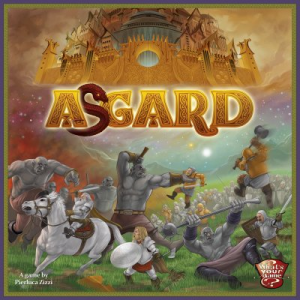On The Radar: Asgard
Posted by James (admin) on October 11th, 2012
 What’s Your Game have published some great games in the past (like Vinhos and one of my favourite worker placement games Vasco de Gama). After releasing no new games last year, it’s great to see they have two this year. Asgard is a viking-themed, worker placement game where players place workers (influence) on different locations (gods) but there’s a lot more to it too and sounds like a meaty eurogame. The board shows the 10 gods (5 light and 5 dark), the various worlds, Asgard and Valhalla.
What’s Your Game have published some great games in the past (like Vinhos and one of my favourite worker placement games Vasco de Gama). After releasing no new games last year, it’s great to see they have two this year. Asgard is a viking-themed, worker placement game where players place workers (influence) on different locations (gods) but there’s a lot more to it too and sounds like a meaty eurogame. The board shows the 10 gods (5 light and 5 dark), the various worlds, Asgard and Valhalla.
The worker placement aspect is a bit different to most worker placement games as players first secretly select on which gods they will place each of their workers (by selecting god cards equal to the number of workers) then they take turns revealing one of their card and placing a worker on one of the available actions of that god (or placing it in Asgard instead if they prefer which has its own benefits), and then they take turns activating one of their workers. (It reminds me a bit of Era of Inventions (a great game from 2011) where players take turns placing their workers and then take turns activating them and the order of activation made a big difference too – but Asgard goes a step or two further.) It sounds like there will be lots of decision-making required as you consider where others will likely place their workers (as there are limited spaces on each god), which actions will work well together, which actions you will need to do before another player, etc. Players will gain and spend workers during the game too so they will need to manage these. Plus, the first worker used on each god earns a light/dark token which are used to buy warriors/giants and new workers (which can trigger battles).
The 2 different types of actions on each god are to request help or build a temple (so the space on which a worker is placed determines the action a worker can execute). Requesting help from a god earns the player enchanted stones and the first placed worker gets to use the god’s ability too. Building a temple costs a worker, stones and warriors/giants but it earns VPs every round and allows the player to place one of the god’s temples in one of the worlds – the player can choose where (there can be one light god and one dark god temple in each world) and earns the player the population tile that is located where the temple will be placed (which gives the player VPs and an ability).
The Asgard action lets a player earn warriors/giants, buy warriors/giants, and buy workers (which have higher costs is you have more workers than other players). New workers can be used for actions but they can also be placed on a world which will trigger a battle in that world – most worlds dictate if the player will be on the light or dark side.
Battles in each world are resolved by comparing the light side versus dark side which are based on the population or god tile (remember the god tiles get placed on worlds when a player builds a temple), plus each round light and dark side get a bonus to their strength too based on which ancient weapon each side has draw that round. (So, the ancient weapons are a bit random but will even out during the game as light and dark both have the same pool of ancient weapons that will be used.) The presence of a god neutralises any opposing population. When the totals are compared, the player who triggered the battle can spend any of their warriors/giants to add strength to the side they are supporting. If a player is on the winning side, they move their worker to the victory area. Once all battles are complete, the players get VPs based on how many workers they have in total in the battle areas.
After 5 rounds, Ragnarok (the final battle) occurs with a fight on each world where 1 or 2 gods are located. If it’s a population versus a god, the population gets an ancient weapon to fight back with. Any warriors/giants that were spent when creating the temples now support the gods in the in the final battle. Players who built temples back the relevant gods in the final battles and can add support too. If a god wins a battle, any player backing them gets some VPs. The player with the most VPs wins the game.
At first sight, Asgard looks like it is complex but, after absorbing the rules, I think it sounds like Asgard just has lots of options (and tokens) so it should deliver a meaty eurogame. It sounds really interesting.
James.

